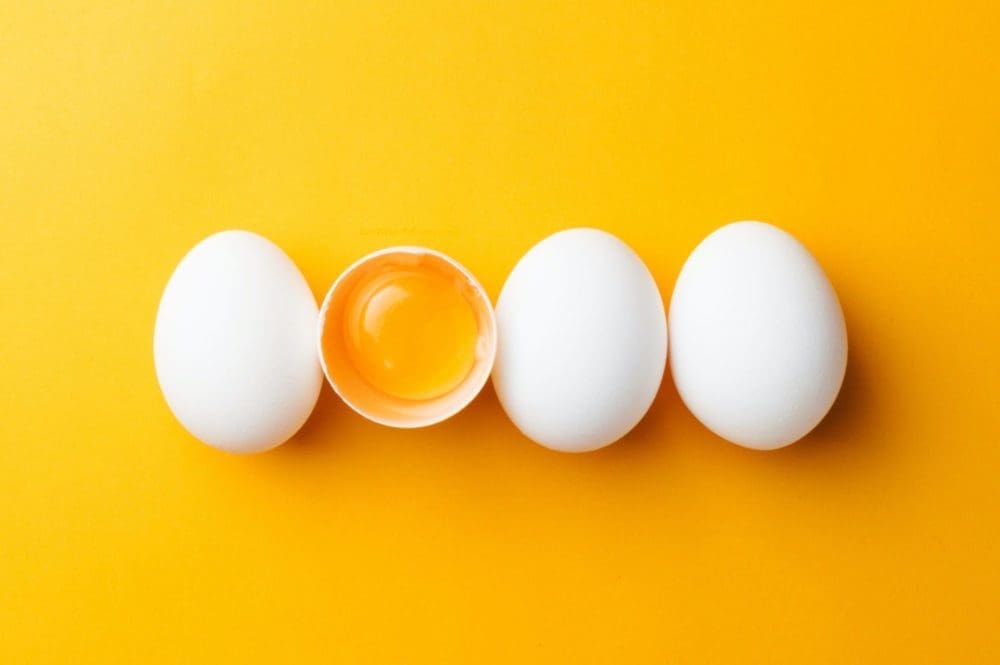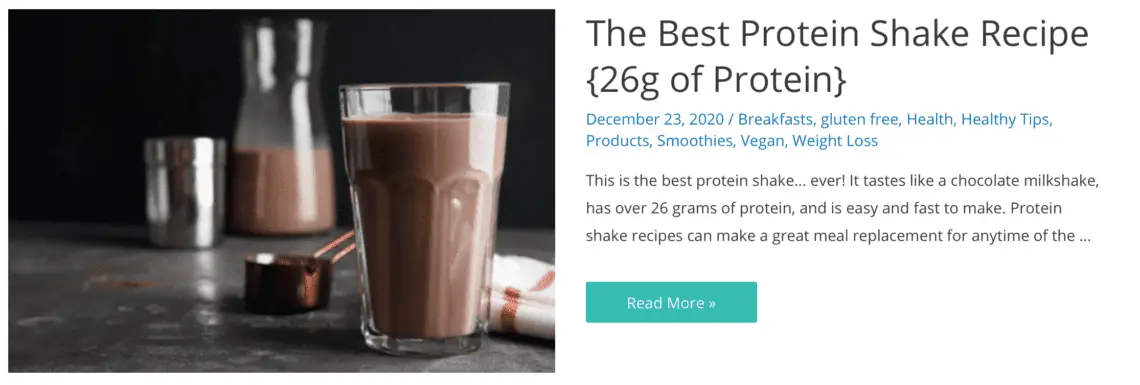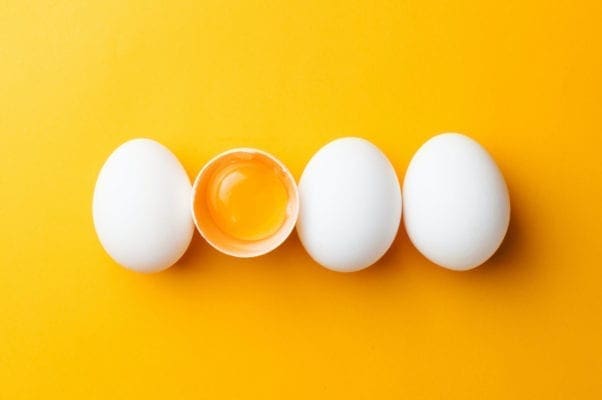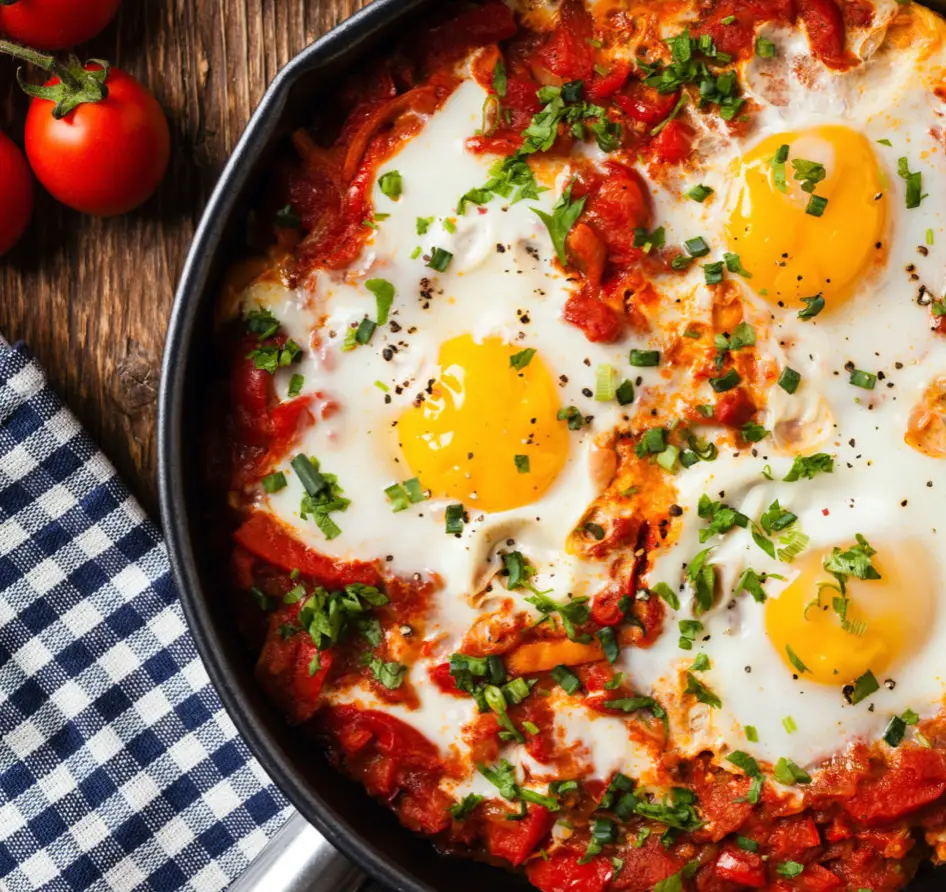This comprehensive guide to Calories in Eggs will supply you with everything you need to know about egg nutrition!
Discover the nutritional benefits of eggs, including their calories, protein content, vitamin and mineral content, and cholesterol levels.


Eggs are one of the most versatile and nutrient-dense foods available. They are an excellent source of protein, vitamins, and minerals.
However, many people are concerned about the calorie content of eggs. In this article, I’ll share an in-depth look at the calorie content of eggs and how they can fit into a healthy diet.
How Many Calories are in an Egg?
The number of calories in an egg depends on its size. A large egg (50 grams) contains about 72 calories, while a medium egg (44 grams) contains about 63 calories.
The calorie content of an egg also varies depending on how it is cooked. For example, a boiled egg contains fewer calories than a fried egg.
Breakdown of Calories in Eggs
In addition to providing protein, vitamins, and minerals, eggs also contain a small amount of fat. The calorie breakdown of an egg varies depending on its size and how it is cooked.
A large boiled egg (50 grams) contains approximately:
- 72 calories
- 5 grams of fat (1.6 grams saturated, 2 grams monounsaturated, and 0.7 grams polyunsaturated)
- 0.4 grams of carbohydrates
- 6 grams of protein
- 186 milligrams of cholesterol
It’s important to note that while eggs do contain cholesterol, research has shown that dietary cholesterol does not significantly impact blood cholesterol levels in most people. Therefore, consuming eggs in moderation is unlikely to have a negative impact on cholesterol levels.
When eggs are cooked in oil or butter, their calorie content increases. Here is an example:
A large fried egg cooked in butter contains approximately:
- 92 calories
- 8 grams of fat (3 grams saturated, 3 grams monounsaturated, and 1 gram polyunsaturated)
- 0.4 grams of carbohydrates
- 5 grams of protein
- 212 milligrams of cholesterol
Overall, the calorie breakdown of an egg is relatively low, making them an excellent food choice for those looking to maintain a healthy diet while still consuming adequate amounts of protein and essential nutrients
Nutrition and Calories in Egg Whites
While the yolk of an egg contains many essential nutrients, the egg white, or albumen, is also a good source of protein and other key nutrients. Here is a breakdown of the nutrition found in a single large egg white (33 grams):
- Calories: 17
- Protein: 3.6 grams
- Carbohydrates: 0.24 grams
- Fat: 0.06 grams
- Cholesterol: 0 milligrams
- Sodium: 55 milligrams
- Potassium: 54 milligrams
As you can see, egg whites are low in calories and contain zero cholesterol, making them an excellent choice for those looking to consume a high-protein, low-calorie diet. The high protein content in egg whites also makes them a popular food choice for athletes and bodybuilders looking to build and repair muscle tissue.
In addition to being an excellent source of protein, egg whites also contain a variety of essential vitamins and minerals, including:
- Riboflavin: Also known as vitamin B2, riboflavin plays a crucial role in energy production and metabolism.
- Selenium: This mineral is important for maintaining a healthy immune system and protecting the body against oxidative stress.
- Potassium: An essential mineral that helps regulate blood pressure and maintain healthy heart function.
- Magnesium: This mineral is important for maintaining healthy bones and teeth, and is also crucial for energy production and muscle function.
Overall, egg whites are a nutritious and versatile food that can be incorporated into a variety of meals and snacks. Whether you’re looking to build muscle, maintain a healthy weight, or simply enjoy a delicious and nutritious meal, egg whites are an excellent choice.
Nutritional Value of Eggs
Eggs are not only low in calories but are also packed with essential nutrients. They are an excellent source of protein, vitamins, and minerals, including vitamin A, vitamin D, vitamin B12, and iron. One large egg provides approximately 6 grams of protein, making it an ideal food for those looking to increase their protein intake.
Are Eggs Good for Weight Loss?
Many people avoid eggs when trying to lose weight, thinking they are high in calories. However, research has shown that incorporating eggs into a weight loss diet can be beneficial. The high protein content of eggs can help to reduce appetite, leading to a decrease in overall calorie intake.
How to Incorporate Eggs into a Healthy Diet
Eggs can be a healthy addition to any diet, as long as they are consumed in moderation. To keep calorie intake under control, it is recommended to eat eggs in combination with other nutrient-dense foods, such as vegetables and whole grains.
10 Health Benefits of Eggs
Eggs are not only delicious but also incredibly nutritious. Here are 10 health benefits of incorporating eggs into your diet:
- Rich in Nutrients: Eggs are loaded with nutrients that our body needs, such as high-quality protein, vitamins, and minerals. They are particularly rich in vitamin B12, vitamin D, and choline.
- Promotes Weight Loss: Eating eggs can help with weight loss. The high protein content in eggs can help increase feelings of fullness and decrease appetite, leading to a reduced calorie intake.
- Good for Brain Health: The choline in eggs is essential for brain health and development. It is a nutrient that many people are lacking in their diets.
- Boosts Immune System: Eggs contain selenium and vitamin D, both of which are important for a healthy immune system. Adequate intake of these nutrients can help protect against illness and disease.
- Helps Prevent Macular Degeneration: Eggs contain lutein and zeaxanthin, two antioxidants that are known to help prevent macular degeneration, a leading cause of blindness in older adults.
- Promotes Healthy Hair and Nails: The high protein content in eggs can help strengthen hair and nails, making them less prone to breakage.
- Helps Regulate Blood Sugar: The protein and fat in eggs can help regulate blood sugar levels, making them a good food choice for people with diabetes.
- Reduces Risk of Heart Disease: Contrary to previous beliefs, research has shown that consuming eggs does not increase the risk of heart disease. In fact, the nutrients in eggs, such as omega-3 fatty acids and vitamin D, may even reduce the risk of heart disease.
- Promotes Healthy Pregnancy: Eggs are an excellent food choice for pregnant women due to their high nutrient content. The choline in eggs is particularly important for fetal brain development.
- Easy to Add to your Diet: Adding eggs to your diet is easy! I have shared 10 healthy egg recipes in the next section. Try out a few and choose our favorite.
Healthy Recipes with Eggs
1. The Best Easy Deviled Eggs
These deviled eggs are made with no mayo! They are low in calories and high in protein, and a great snack!
You don’t have to wait for a holiday party or potluck to make this big protein egg recipe! Make a tray and snack on them all week long … at just 42 calories you can’t go wrong!
2. Perfect Boiled Eggs
Learn how to make the perfect boiled eggs with this how to guide.
You even get a visual guide for desired doneness and minutes to boil… It’s almost too easy to make this high protein egg recipe.
3. The Best Shakshuka Recipe
This low calorie, high protein vegetarian egg recipe is great for dinner as well as breakfast!
Now you can boost your protein with an elegant dinner. Serve hot tonight and enjoy leftovers for breakfast tomorrow… bonus!
4. The Best Eggs Benedict Recipe
We cut 100’s of calories in this Eggs Benedict recipe! So you get a high protein egg recipe, without all of the calories.
Tips to make this a vegetarian dish are included…
5. The Easiest Recipe for Chilaquiles
This 10 minute meal is a traditional breakfast… but is truly yummy anytime of the day.
Best of all, it’s just 141 calories per serving, so you can have 2, or 3 servings!
6. Baked Eggs In Hash Browns
This recipe for baked eggs is great for meal prepping and breakfasts on the go.
Try this protein rich egg recipe and even learn how to make hash browns at home with a box grater!
7. The Best Omelette Recipe
This high protein omelet recipe can be made with or without meat. We’ve included recipes for a vegetarian omelet recipe, as well as a meaty protein packed omelet.
Tips to boost protein while lowering calories by adding egg whites are included.
8. Low Calorie Avocado Toast
This low calorie easy breakfast tops avocado toast with eggs. To get everything you need to start the day off right.
Now you can increate your protein, healthy fats and greens, thanks to this high protein egg recipe.
9. The Best Breakfast Burrito Recipe
This low calorie, high protein breakfast burrito will curb your cravings while boosting your protein intake.
Directions to make this a vegetarian egg recipe, or a meaty breakfast burrito are included, plus directions on making them into “frozen breakfast burritos” for hectic mornings.
10. Easy Recipe for Breakfast Casserole
If you’re a fan of meal prepping, or just have a large crowd to feed, try a protein packed egg casserole.
This low calorie, high protein breakfast casserole can be made vegetarian or meaty, and is packed with good for you ingredients.
These 10 recipes for healthy, protein packed egg recipes can help you eat healthier and boost protein in your diet.
Now that you have all the information of eggs and protein, and 10 protein rich recipes to try, check out the next section for more high protein recipes.
Perfect High Protein Egg Omelet
Now that you have learned the calories in eggs, and all their wonderful health benefits. Check out this low calorie egg recipe:


The BEST Omelet (204 CALORIES 17g PROTEIN)
Ingredients
- Olive oil spray
- 1 cup baby spinach
- 2 large eggs
- Salt and pepper
- 2 tablespoons swiss cheese or sharp cheddar, feta, or goat cheese
Instructions
- Lightly spray a small skillet with olive oil spray and place over medium heat.
- Add the spinach and cook until wilted and cooked down to about 1/2 cup.
- Move the spinach to a plate, and spray the skillet again with olive oil and place on the burner again (at medium heat).
- In a medium bowl, whisk together the eggs with 1 teaspoon of water and a pinch of salt and pepper.
- Pour the eggs into the hot skillet and cook, undisturbed, until they start to bubble up and pull away from the sides of the pan.
- Add 1/2 of the cheese on one side of the omelette, top with cooked spinach and remaining cheese.
- Fold the bare side over over the side with the fillings and cook for 2 minutes.
- Flip and cook for 2 minutes more before moving to a plate. Serve hot.
Nutrition
Frequently Asked Questions (FAQ)
Yes, eggs are a nutritious food that can be a healthy part of a balanced diet. They are a good source of high-quality protein, essential vitamins, and minerals.
For most people, eating eggs does not significantly impact cholesterol levels. However, if you have high cholesterol or a family history of heart disease, it is recommended to speak with your healthcare provider about how many eggs to include in your diet.
Egg whites are a lower calorie, lower fat, and cholesterol-free option compared to egg yolks. However, the yolk contains essential nutrients such as vitamins A, D, E, and K, as well as healthy fats.
Eggs should be stored in the refrigerator at a temperature of 40°F or below. They should be kept in their original carton to prevent odors from other foods in the refrigerator from being absorbed.
Consuming raw or undercooked eggs may increase the risk of foodborne illness. It is recommended to cook eggs thoroughly before consuming them.
The color of the egg shell does not affect the nutritional value of the egg. The nutritional content of the egg is determined by the hen’s diet.
The recommended daily intake of eggs varies depending on age, gender, and overall health. Generally, it is safe for most people to consume up to one egg per day as part of a balanced diet.
Organic eggs are produced by hens that are fed an organic diet and have access to the outdoors. While there is some evidence to suggest that organic eggs may contain higher levels of certain nutrients, more research is needed to fully understand the potential health benefits.
Final Thoughts
In conclusion, eggs are a nutritious and versatile food that can be a healthy addition to any diet. While they do contain calories, they are low in calories compared to their nutritional value.
By incorporating eggs into a healthy diet, individuals can enjoy their numerous health benefits without compromising their weight loss goals.
What to Read Next:






Lose Weight By Eating Cookbooks


Pin this Article to Pinterest:


Article History:
- Written and posted on February 25, 2021 by Audrey Johns
- Updated on March 7, 2023 by Audrey Johns










